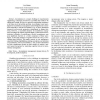Free Online Productivity Tools
i2Speak
i2Symbol
i2OCR
iTex2Img
iWeb2Print
iWeb2Shot
i2Type
iPdf2Split
iPdf2Merge
i2Bopomofo
i2Arabic
i2Style
i2Image
i2PDF
iLatex2Rtf
Sci2ools
RE
2015
Springer
2015
Springer
Cognitive factors in inconsistency management
—Inconsistency is a major challenge in requirements engineering, commonly perceived as a problem that needs to be eliminated on sight. However, in practice maintaining consistency at all times is an intractable problem. Accordingly, recent paradigms for inconsistency management acknowledge that it is sometimes desirable to tolerate inconsistency, e.g. to allow distributed teamwork and prevent premature commitment to design decisions. However, a successful adoption of inconsistency managment paradigms in industry depends highly on the human factor: intolerant attitudes of practitioners toward inconsistency may pose significant barriers to a wider acceptance of these paradigms. A thorough analysis of cognitive factors is a key to overcoming these barriers. This paper reports on our preliminary empirical findings highlighting existing perceptions and attitudes of practitioners toward inconsistency, and propose dimensions for their classification. Based on these results, we outline a gen...
| Added | 17 Apr 2016 |
| Updated | 17 Apr 2016 |
| Type | Journal |
| Year | 2015 |
| Where | RE |
| Authors | Irit Hadar, Anna Zamansky |
Comments (0)

